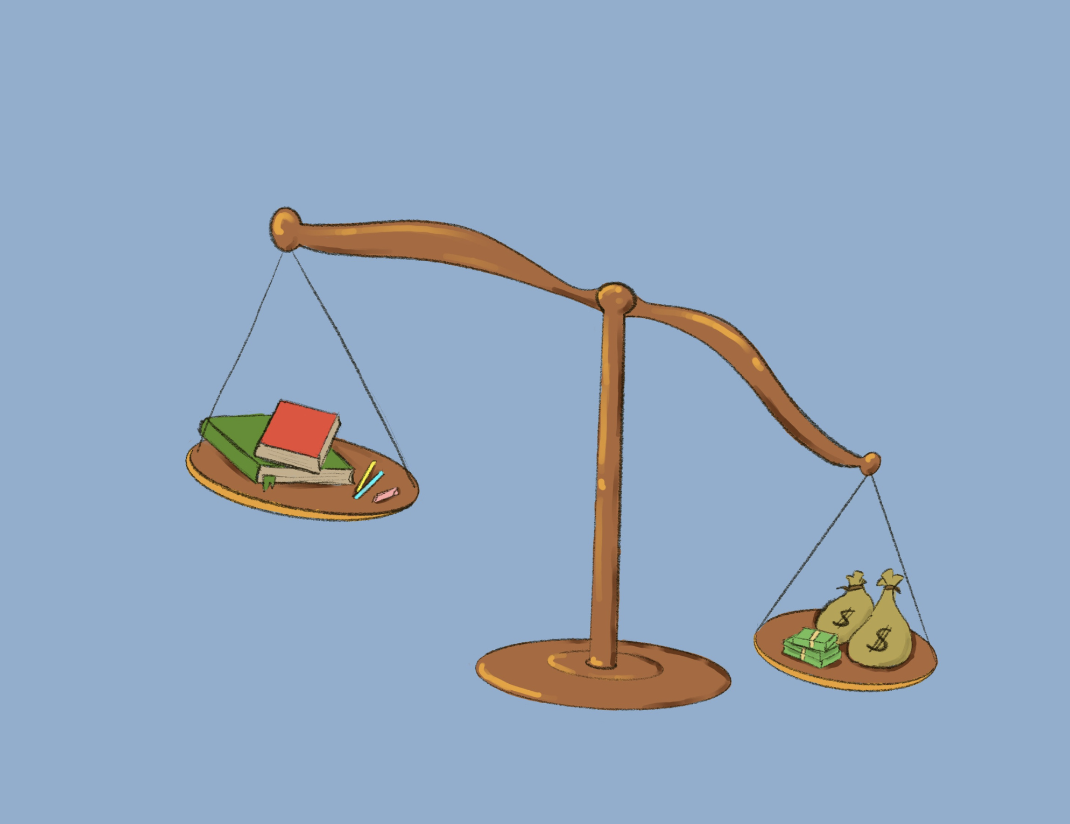Here’s an interesting statistic: from 1980 to 2019, the cost of college education increased by 169%. Compare that to the 19% wage increase for 20-year-olds over the same period, and it makes sense why people question the true worth of a college education. Even if technical schools and apprenticeship programs are viable options for students, it’s become abundantly clear that the benefits of higher education do not outweigh the financial disadvantages. So for these students who want a college degree, is the only option to be weighed down with debt for the next several decades post-graduation? What is the reason behind these obscene costs of attendance? All questions worth being asked, and whose answers lie in a foundational idea of the American ideal: the free market.
A free market system essentially means that if there is a need for some service or product, businesses can compete to provide the product or service without government interference or regulation; a service that is increasingly in demand in our country lately is college education. From the 2021-22 application cycle to the 2022-23 cycle, the volume of total applications increased by 30%, as per March 2023’s Common Application statistics. People want to go to college, and higher-learning institutions are beginning to take advantage of this fact by adopting corporate models. As the goals of universities are shifting from education to profit, not only are tuition costs skyrocketing, but the quality of education is decreasing.
Colleges adopting the corporate model, for instance, have taken to trying to “churn out” as many graduates as possible through completely online degree programs, according to the American Psychological Association. Such degree programs vary from two-year Associate’s programs to PhDs, meaning people can get doctoral degrees and begin working with this qualification solely from something more akin to MasterClass than traditional education. This trend is particularly popular with psychology-related degrees, as there has been an increasing demand for professionals in this sector. While online courses are much more effective than they are perceived to be, no amount of virtual learning will be able to replace the practical experiences of in-person education at a university. Proponents of online degrees will say that such programs make education more accessible, which is true. But this is done at the expense of the quality and depth of an education. Think about it this way: you wouldn’t trust a surgeon who’s only ever trained through simulations to operate on you, and the same logic should apply to other fields that can be mastered via a college education.
Another concerning trend is the shift towards hiring non-tenure track faculty. Institutions are leaning towards hiring part-time teachers over experienced and tenured professors with more experience to cut costs. As a direct result, students are being taught by less experienced instructors, and those instructors are being discouraged from pursuing further education for themselves as well. Most students and parents, however, don’t see this as an issue, because as long as students are getting the grades they want, parents don’t complain––or worse, they are not even aware of what is happening. This lack of response from consumers just makes it easier for colleges to keep cutting costs and corporatizing in one fell swoop.
If you’re going to be paying $80k a year, you should be getting $80k worth of quality education. College isn’t just for learning—it’s for networking and getting the experiences people need to be competent, qualified, and successful workers and leaders. As long as corporatization continues within institutions, their goals of profit will impede the societal need for experienced and educated individuals. Students will not get the opportunities they need to launch successful careers, and in the long run, we are risking every aspect of our society by letting the free market take advantage of post-secondary education.
Luckily, America isn’t a completely free market because our government sets necessary regulations to protect the rights of individuals and businesses. Take, for instance, the drastic governmental control that was established over monopolies in the American Progressive era; when massive businesses began amassing insane profits and jeopardizing the overall freedom of the American people, the federal government stepped in with regulations to limit the size and power of such companies. Colleges may not have arrived at that point yet, but some serious action is necessary to ensure that they never do. Lowering the cost of attendance has been discussed to make college more affordable, from holding loan companies more accountable for realistic aid options to forgiving student debt. However, this doesn’t address the root of the problem, which is the corporate framework on which higher education is built.
In the same years, that we’ve seen more and more colleges corporatize, leaders worldwide have seen an increase of 35% in their salary, and they are getting that money from the conglomeration of increasing tuition costs and costs cut from paying professors, adjuncts, and TAs (who have seen a 49% pay decrease). Administrators are equally important as educators within the college community; but when the amount of administrators at private schools has increased 135% in the past 30 years while educational quality is being compromised, you really do have to question the budgeting of such institutions. Colleges are not at a lack for money: they have the expensive tuition they collect from their students, massive endowments, and even federal aid.
We need to start holding the institutions more accountable for the usage of their funds and to hold them to higher standards in terms of quality. This isn’t just an issue of getting “ripped off,” even though that’s what it seems like with sky-high tuition and lackluster learning experiences. It’s an issue of accessibility; college used to be the best way to get out of poverty for underprivileged students, but now it’s probably the best way to be saddled with lifelong financial trouble for students of various economic backgrounds. It’s an issue of progress; we can’t expect to see a future where individuals can continue to innovate and change the world when we aren’t providing them with the foundations they need to do so. It’s an issue that will eventually cripple society as a whole; action is required, even if it means “compromising” on inherently American ideals.





































